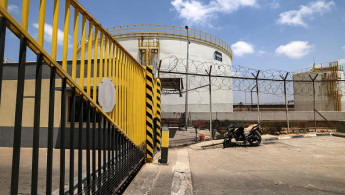Gaza's only power plant closes over lack of fuel as Israeli tightens blockade
The Gaza Strip's sole power plant shut down on Saturday after running out of fuel, an electricity company spokesman said, five days after Israel closed its goods crossing with the besieged Palestinian enclave.
"The power plant in Gaza has stopped (working) due to the fuel shortage," said Mohammed Thabet, spokesman for the electricity company.
The power station has gone without fuel deliveries through Israel since the country shut its goods and people crossings with Gaza on Tuesday.
#Gaza's power plant shut down at noon as Israeli closure of crossings disrupts fuel supplies, further worsening a prolonged power shortage and leaving residents with only 4 hours of electricity a day in a sweltering summer.
— Fares Akram (@faresakram) August 6, 2022
The electricity supply is expected to plummet to just four hours a day, Thabet said.
Diesel for the power plant is usually trucked in from Egypt or Israel, which has maintained a blockade of the enclave since the Hamas group took control of Gaza in 2007.
Israel's closure of its crossings with Gaza came over fears of reprisals following the arrest of two senior Palestinian Islamic Jihad members in the occupied West Bank.
Israel has since launched a series of attacks on Gaza, killing at least 11 people, including a five-year-old girl. The airstrikes on the besieged enclave also caused serious damage to several buildings and homes, and have left at least 75 people injured, according to health authorities.
Israel says it launched the assaults to fend off attacks by Islamic Jihad following the arrest of some of its members.
In a statement earlier on Saturday, Gaza's electricity company said the shutdown "will affect all public utilities and crucial installations and exacerbate the humanitarian situation".
The company called on "all parties to urgently intervene and allow the entrance of fuel deliveries for the power plant to work".
Gaza's 2.3 million residents experience regular power shortages and last week received only an average of 10 hours of electricity per day, according to data from the UN's humanitarian agency OCHA.
Moreover, residents suffer substantial consequences as a result of the blockade, impacting living standards, travel, education and medicine acquirement, with rights groups condemning it as a form of illegal collective punishment.




 Follow the Middle East's top stories in English at The New Arab on Google News
Follow the Middle East's top stories in English at The New Arab on Google News
![A group of Palestinians, foreign and Israeli activists gather to participated in an olive picking event on the land in the town of Battir, which is under threat of confiscation by Israel in Bethlehem, occupied West Bank on 8 November 2024. [Getty]](/sites/default/files/styles/image_330x185/public/2182930803.jpeg?h=199d8c1f&itok=__0LgGsa)

![People gathered around the rubble of destroyed houses to search for survivors [Getty]](/sites/default/files/styles/image_330x185/public/2024-11/GettyImages-2184733820.jpg?h=199d8c1f&itok=NiM1LO2f)